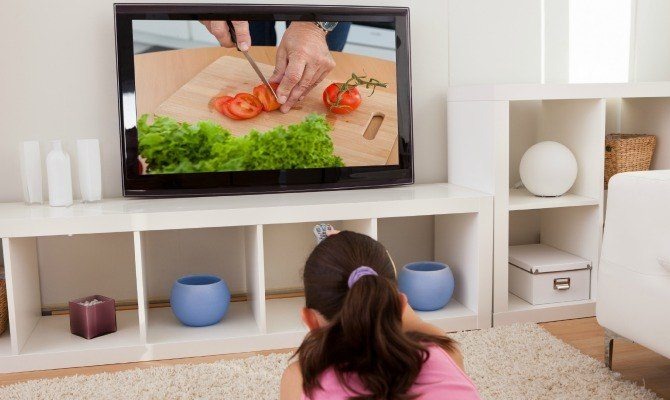New Study Reveals That Watching Cooking Shows Could Be Linked To Weight Gain
A recent study, published in the journal Appetite, found that women ages 20 to 35 who watch cooking shows — and then cook from scratch — weigh more and have higher BMIs than those who simply watch (and do not cook). Are cooking shows leading us to make unhealthy meals? Lisa Gorman, RN and director of the St. Joseph Health Wellness Corner in Irvine, weighs in.
The article talks about two different kinds of people: "viewers" and "doers." In your opinion, how does simply viewing a cooking show lead to increased weight?
Nothing about the television directly forces us to gain weight, but it sure does seem to make snacking appealing. We snack in a lot of places — in the car, at the office, or even at our child's swim practice — but nothing is quite as conducive to snacking as an evening in front of the television. When you watch food being cooked on television – or even when you see advertisements that contain food or actors holding glasses of wine — your mind creates a subconscious desire for that food. Since watching TV is not a mindful activity, people tend to act on these desires more readily. This can be a dangerous situation when all of your kitchen ingredients are just a few steps away from the living room. A snack every now and then isn't a bad thing, but you should be mindful of what you are eating. I tell all my patients to practice mindful eating, which means separating mealtime from all other tasks and entertainment, including television. I don't recommend eating in front of the TV, or any electronic device, for the same reasons I wouldn't encourage people to eat lunch at their desks: When you are cognizant of what you eat and how it makes you feel, you can enjoy the food more and acknowledge when you're full. Having a healthy and mindful meal can also keep you from over-snacking later.
This study only looks at women. Do you know of any studies where the participants were men? Or do you have any thoughts about how gender could influence the results of this study?
[pullquote:left]From my experience at the St. Joseph Health Wellness Corner in Irvine, this does not appear to be a gender-specific issue. Like women, men also struggle with non-mindful eating, and they prepare meals and watch cooking shows just like their female counterparts. A 2012 study conducted by researchers from the University of Michigan found that men watch cooking shows and read magazine articles on cooking just as much as women do. It did point out that more women cook, which may have been part of the reason that women were surveyed in the most recent study.
Given the results of this study, what are a few pieces of advice that you would give to someone who regularly watches cooking shows?
As I mentioned, mindful eating is incredibly important. Try to remove technology and other sources of entertainment from your environment, and simply take the time to relax, reflect on the day, and enjoy your plate of food. Eating meals with other people is typically OK because we tend to naturally control and portion ourselves in social situations. Another great way to avoid snacking while watching TV is to exercise. Try watching your favorite show on a treadmill by viewing it from your iPad. You can also move from the couch to the floor and practice simple exercises — like crunches or even stretches — to keep yourself from snacking.
Are there any cooking shows that you would recommend as a professional? Any that might help viewers cook and eat healthier?
I've been a registered nurse with a passion for nutrition for many years and I love to watch cooking shows — there are plenty of programs out there that are entertaining and have given me some great recipe ideas. But when it comes to choosing the show for you, you need to be your own referee. If a cook is using two sticks of butter to make a dish that has just four servings, it's probably not the healthiest source of recipes. That said, you can always work to make your own healthy version of recipes you find on television. Personally, I enjoy Ellie Krieger, a nutritionist on Food Network, because she takes traditional recipes and makes them heart-healthy. Decreasing the amount of fat and sugar you use in a recipe is an easy way to decrease its overall calorie count.
Lisa Gorman, RN, is the director of the St. Joseph Health Wellness Corner in Irvine. Lisa has worked in wellness and prevention for more than 10 years, and is currently a registered nurse with 25 years of health care experience.
Kristie Collado is The Daily Meal's Cook Editor. Follow her on Twitter @KColladoCook.
